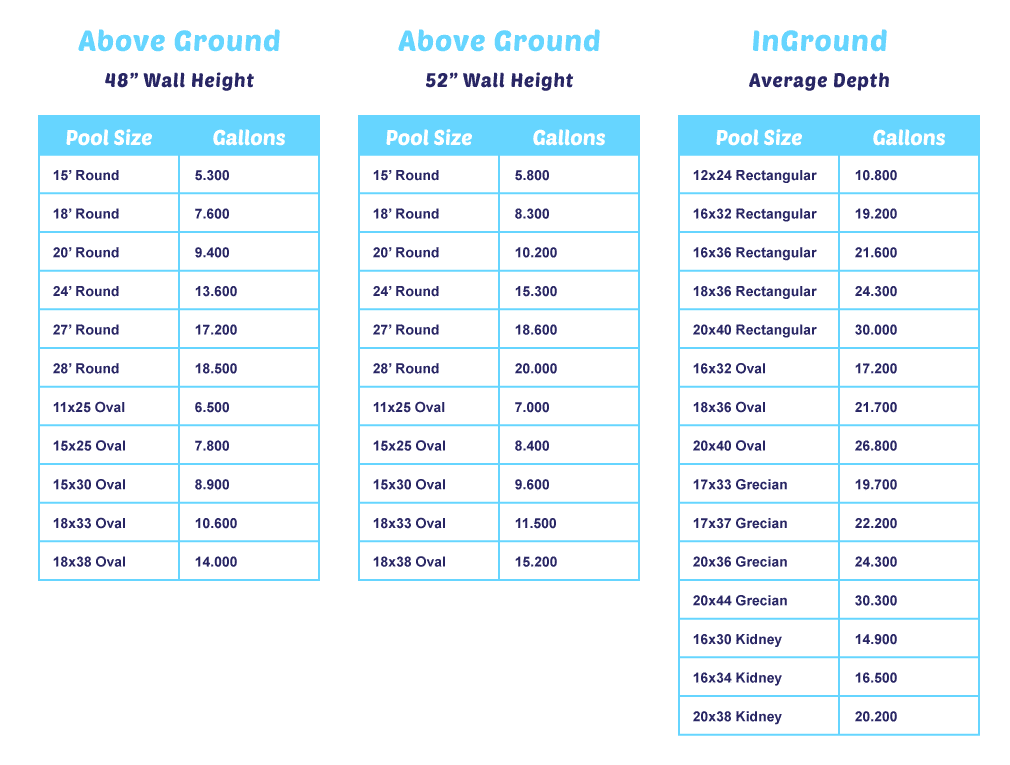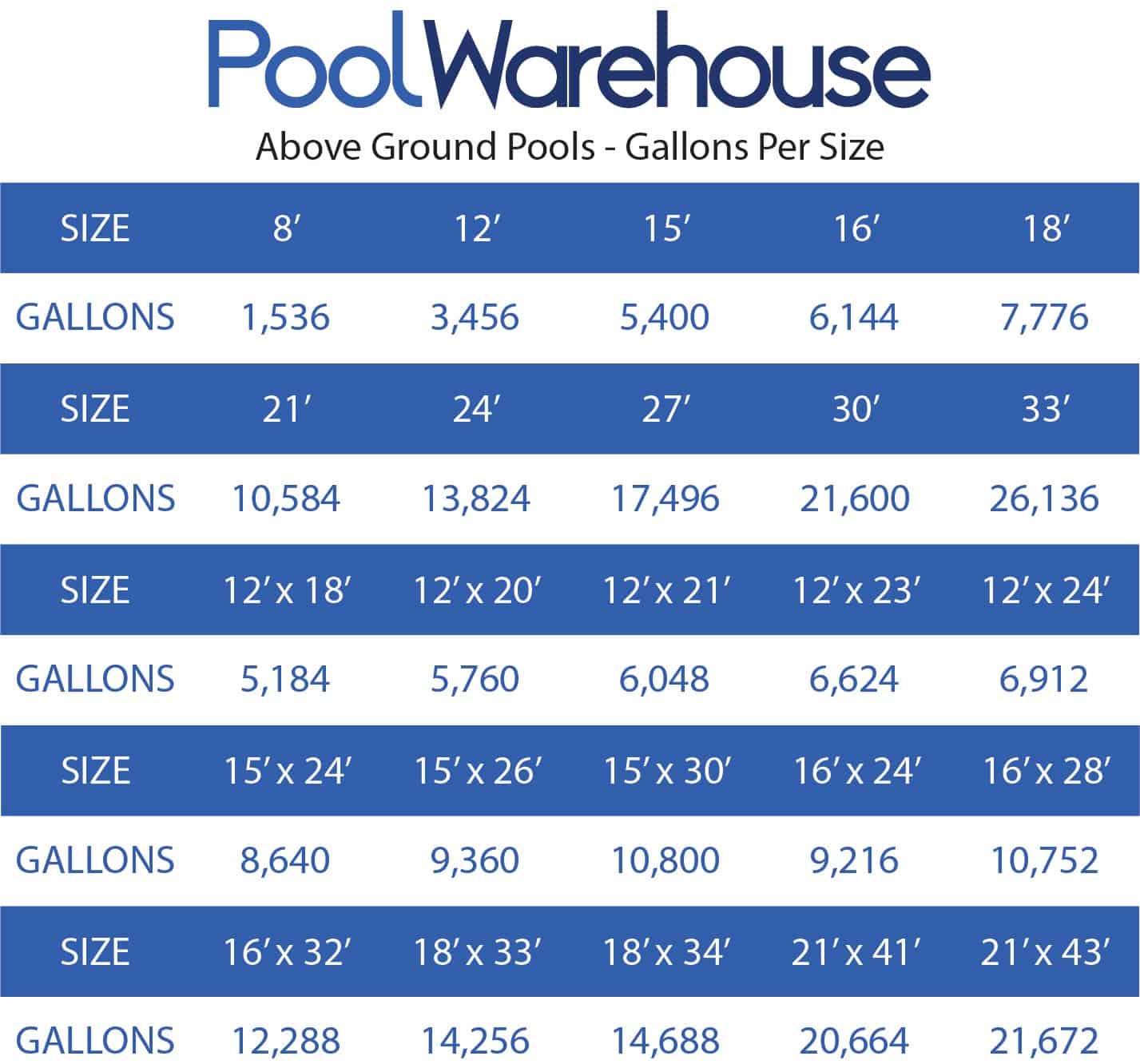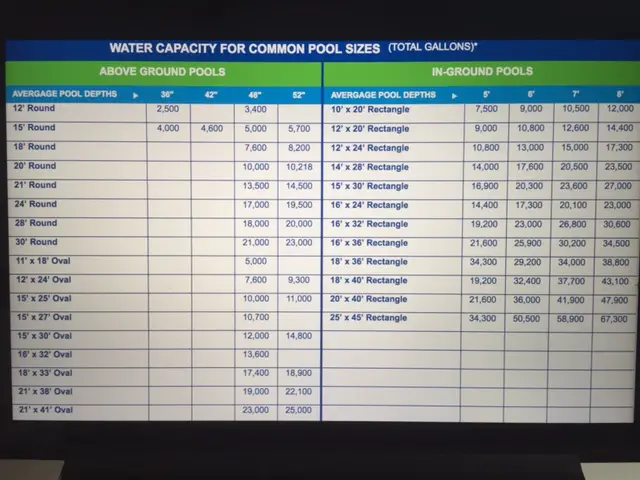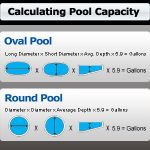Your pool’s capacity in gallons can be determined by multiplying its dimensions (length, width, and average depth) and a conversion factor of 7.48. Let’s calculate it!
Welcome to the world of pool ownership, where knowing your pool’s capacity is essential for proper maintenance and chemical balance. Whether you’re planning a pool party or just curious about how many gallons your pool holds, calculating this measurement is relatively straightforward.
By multiplying the length, width, and average depth of your pool, and then multiplying that number by a conversion factor of 7. 48, you can determine the number of gallons your pool can accommodate. We will guide you through the steps to accurately calculate your pool’s capacity and ensure that you’re well-informed about the water volume that your pool holds.

Credit: www.reddit.com
Methods Of Measuring Pool Gallons
Using Formulas Based On Pool Shape
When determining the volume of a swimming pool, the shape plays a crucial role. Rectangular, circular, and oval pools each have specific formulas that can be applied to calculate their gallons. For instance, the formula for a rectangular pool is Length (ft) x Width (ft) x Average Depth (ft) x 7.5.
Utilizing Water Level And Container Method
If you don’t have the pool dimensions, utilizing the water level and container method can be helpful. First, measure the water level of the pool, then fill a known-size container and subtract the pool water level from the total volume of water added to determine the pool capacity.
Advanced Techniques With Technology
Modern technology offers advanced techniques for measuring pool gallons. Devices like ultrasonic sensors and pool volume calculators can accurately determine the volume of water in a pool. By using these tools, pool owners can ensure precise calculations and appropriately adjust chemical treatments and filtration systems.

Credit: www.swimuniversity.com
Factors Affecting Pool Gallon Measurement
Before determining the exact number of gallons in your pool, it’s important to consider several factors that can impact the overall volume. Understanding these variables will help ensure accurate measurements for maintenance and chemical treatment, as well as facilitate efficient water circulation.
Pool Shape And Dimensions
The shape and dimensions of a pool play a significant role in determining its water capacity. Rectangular, oval, kidney-shaped, and irregularly shaped pools all have distinctive volume calculations. Additionally, the length, width, and overall depth are essential components in accurately ascertaining the total gallonage.
Depth Variations And Sloping
Varying water depths and sloping bottoms can affect the overall gallon measurement of a pool. Deeper areas will contain more water, while sloping bottoms may necessitate specific volume calculations to accommodate the changing depths.
Additional Features Impact On Volume
- Incorporating features such as spa areas, beach entries, waterfalls, or attached hot tubs will influence the total volume of the pool.
- Decking, coping, and surrounding landscaping can also impact the overall water capacity.
Implications Of Accurate Pool Gallon Measurement
Measuring your pool’s gallons accurately is crucial for maintaining a clean and safe swimming environment. Incorrect measurements can lead to inadequate chemical distribution, equipment inefficiency, and poor water circulation.
Correct Chemical Dosage And Maintenance
Proper chemical dosing is essential for preventing harmful bacteria growth and keeping the water safe for swimming.
- Accurate pool gallon measurement ensures correct chemical quantities are used.
- Regular maintenance avoids algae buildup and maintains water clarity.
- Avoid overchlorination by using accurate pool gallon measurements.
Proper Equipment Sizing And Upgrades
Appropriate equipment size ensures efficient circulation and filtration of pool water.
- Matching equipment to the correct pool gallon measurement improves system performance.
- Upgrading equipment based on accurate measurements enhances energy efficiency.
Optimizing Water Circulation And Filtration
Effective water circulation and filtration are vital for maintaining water quality.
- Accurate gallon measurement assists in optimal water flow through the filtration system.
- Regular filter maintenance based on correct measurements ensures cleaner water.
- Proper circulation prevents water stagnation and algae growth.

Credit: www.poolwarehouse.com
Challenges In Pool Gallon Calculation
Calculating the number of gallons in your pool may seem like a straightforward task, but there are several challenges that can make it more complicated. From irregularly shaped pools to incomplete or outdated pool plans, and even seasonal and evaporative losses, accurately determining the number of gallons in your pool requires careful consideration. In this section, we will delve deeper into these challenges and explore how they can impact your pool gallon calculation.
Irregularly Shaped Pools
If you have an irregularly shaped pool, such as a kidney or freeform pool, determining the exact number of gallons can be a daunting task. These pools don’t have simple geometric shapes like rectangles or circles, making it difficult to calculate the volume. One way to overcome this challenge is by breaking down the pool into smaller, more manageable sections.
| Section | Dimensions (ft) |
|---|---|
| Shallow End | 10 x 15 |
| Deep End | 20 x 25 |
| Center | 30 x 10 |
By dividing the pool into sections like the shallow end, deep end, and center, you can calculate the volume for each section separately and then add them together to get the total gallons for the pool.
Dealing With Incomplete Or Outdated Pool Plans
Another common challenge when calculating pool gallons is dealing with incomplete or outdated pool plans. Over time, pool modifications or renovations may have been made, altering the original dimensions. In such cases, relying on outdated plans can lead to inaccurate gallon calculations.
- Consult with a professional: If your pool plans are incomplete or outdated, it’s best to consult with a professional pool builder or designer. They can accurately measure your pool and provide you with the necessary information to calculate the gallons.
- Use digital tools: There are also digital tools available that can help you calculate pool gallons based on accurate measurements. These tools often take into account irregular shapes and can provide more precise results.
Seasonal And Evaporative Losses
When it comes to pool gallon calculations, it’s important to consider seasonal and evaporative losses. Throughout the year, pools experience water loss due to evaporation, splashing, and backwashing. This means that the actual number of gallons in your pool may vary depending on the time of year.
To account for seasonal and evaporative losses, you can regularly monitor the water level in your pool and make adjustments as needed. This way, you can maintain an accurate estimate of the number of gallons in your pool.
In conclusion, the challenges associated with pool gallon calculation can be overcome with careful consideration and proper measurement techniques. By addressing irregularly shaped pools, incomplete or outdated pool plans, and accounting for seasonal and evaporative losses, you can ensure a more accurate estimation of the number of gallons in your pool.
Common Myths And Misconceptions
Bigger Is Not Always Better
When it comes to pools, there’s a common misconception that a bigger pool is always better. Some believe that a larger pool automatically means more enjoyment, but that’s not always the case. In reality, the size of your pool should suit your specific needs and the available space in your backyard.
Assuming Standard Gallons For Common Shapes
Many pool owners simply assume that their pool holds a specific number of gallons based on its shape. However, this assumption can be inaccurate. Pools come in various shapes and sizes, so it’s important to measure the actual dimensions and use an accurate formula to determine the true volume.
Belief In Eye-balling Estimates
Some people tend to eyeball the volume of their pool, relying on rough estimates or guesswork. However, this method is unreliable and can lead to inaccurate measurements. It’s essential to use precise calculations to determine the correct volume of your pool for proper maintenance and chemical balance.
Expert Tips For Accurate Measurement
When it comes to determining the size of your pool, accurate measurement is essential. Here are some expert tips to ensure you get the most precise calculation possible.
Regular Updates And Recalibration
Regularly updating and recalibrating your measuring tools is crucial for accurate results. This ensures that the measurements stay precise and reliable over time.
Utilizing Pool Volume Apps And Tools
Utilize pool volume apps and tools to simplify the measurement process. These resources can provide accurate calculations based on the dimensions and shape of your pool.
Seeking Professional Assistance
If you’re unsure about measuring your pool’s volume accurately, consider seeking professional assistance. Pool experts have the knowledge and specialized tools to provide precise measurements.
Conclusion
Knowing the exact volume of your pool is crucial for proper maintenance and enjoyment. By calculating the number of gallons, you can ensure the right chemical balance and water level. Using a simple formula, you can determine the gallon capacity and keep your pool in top condition for a refreshing and relaxing swim.





